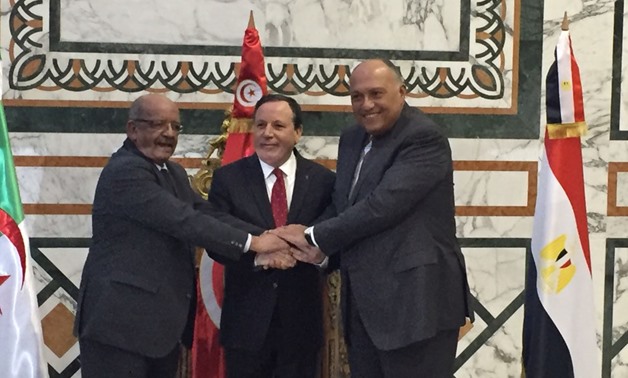
Egypt’s Foreign Minister, Sameh Shoukry, with his Tunisian and Algerian counterparts in Tunisia to discuss the Libyan political course on December 17 – Press Photo
CAIRO – 18 December 2017: Egyptian Foreign Ministry’s spokesman Ahmed Abou Zaid posted on Twitter the final statement of the tripartite meeting, which took place in Tunisia on Saturday and Sunday.
Egypt’s Foreign Minister, Sameh Shoukry, took part in the fourth coordinating meeting of the Egyptian, Tunisian and Algerian foreign ministers within the framework of the initiative launched by Tunisia’s Beji Caid Essebsi for a compressive settlement in Libya.
The foreign ministers of Egypt, Tunisia and Algeria convened in Tunisia on Saturday to resume discussions over the security and political developments of Libya, which has become the largest security threat facing the Egyptian, Tunisian and Algerian states.
The frequent failures of international reconciliation attempts and the fall of weapons into the hands of different militant groups forced Egypt to play a major role in solving the Libyan crisis.
 Egypt’s Foreign Minister, Sameh Shoukry, with his Tunisian and Algerian counterparts in Tunisia to discuss the Libyan political course on December 17 – Press Photo
Egypt’s Foreign Minister, Sameh Shoukry, with his Tunisian and Algerian counterparts in Tunisia to discuss the Libyan political course on December 17 – Press Photo
According to the final statement, Egypt, Tunisia and Algeria asserted their support to the political course in Libya as the only available political option for Libyans.
The tripartite countries’ foreign ministers called on all Libyan factions to pay more attention to the national interest of the Libyan people and concentrate on reaching a state of dialog and consensus.
 Egypt’s Foreign Minister, Sameh Shoukry, with his Tunisian and Algerian counterparts in Tunisia to discuss the Libyan political course on December 17 – Press Photo
Egypt’s Foreign Minister, Sameh Shoukry, with his Tunisian and Algerian counterparts in Tunisia to discuss the Libyan political course on December 17 – Press Photo
The three ministers reaffirmed their countries' firm stance to support efforts to resolve the Libyan crisis, assuring their adherence to dialog as the sole basis for settling the Libyan crisis and rejecting any form of foreign interference in the country.
They expressed their appreciation for the efforts of U.N. Libya Envoy Ghassan Salama, hailing the political plan that he presented to address the Libyan crisis. They also urged all Libyan parties to show sufficient flexibility during the ongoing negotiations.
In November, Shoukry received his Tunisian and Algerian counterparts in Cairo and tackled recent developments in Libya.
 Egypt’s Foreign Minister, Sameh Shoukry, with his Tunisian and Algerian counterparts in Tunisia to discuss the Libyan political course on December 17 – Press Photo
Egypt’s Foreign Minister, Sameh Shoukry, with his Tunisian and Algerian counterparts in Tunisia to discuss the Libyan political course on December 17 – Press Photo
Last week, Egyptian President Abdel Fatah al-Sisi met with Libya’s chairman of the Presidential Council, Fayez al-Sarraj, and discussed political accords necessary to preserve Libya’s unity and integrity.
The meeting was attended by high-profile leaders from both sides, namely Libyan Foreign Minister Mohamed al-Taher, Libyan Minister of Finance Osama Hammad, Egyptian Foreign Minister Sameh Shoukry, Egyptian Minister of Finance Amr El-Garhy, Egyptian Intelligence Chief Khalid Fawzy and the Egyptian ambassador to Libya.
.jpg) Egypt’s Foreign Minister, Sameh Shoukry, with his Tunisian and Algerian counterparts in Tunisia to discuss the Libyan political course on December 17 – Press Photo
Egypt’s Foreign Minister, Sameh Shoukry, with his Tunisian and Algerian counterparts in Tunisia to discuss the Libyan political course on December 17 – Press Photo
Egypt’s presidential spokesman, Bassam Rady, said in a statement that Egypt welcomes the frequent meetings of the Libyan military commanders in Cairo; he also stressed that Egypt confronts any form of foreign proposal aimed at intervening in Libya’s domestic affairs.
“Sisi and Sarraj tackled means of cooperation between the two countries in combating terrorism and boosting international endeavors for developing a comprehensive strategy against terrorism,” Rady said.
 Egypt’s Foreign Minister, Sameh Shoukry, with his Tunisian and Algerian counterparts in Tunisia to discuss the Libyan political course on December 17 – Press Photo
Egypt’s Foreign Minister, Sameh Shoukry, with his Tunisian and Algerian counterparts in Tunisia to discuss the Libyan political course on December 17 – Press Photo
In December 2015, 22 Libyan parliamentarians signed the Skhirat Agreement in Morocco to end the country’s civil war, which erupted in 2014. The Skhirat Agreement was put into practise on April 6, 2016.
The Government of National Accord, led by al-Sarraj, was the first concrete outcome from the Skhirat Agreement. The first meeting of the Cabinet of the Government of National Accord took place on January 2, 2016 in Tunisia.




.jpg)

Comments
Leave a Comment